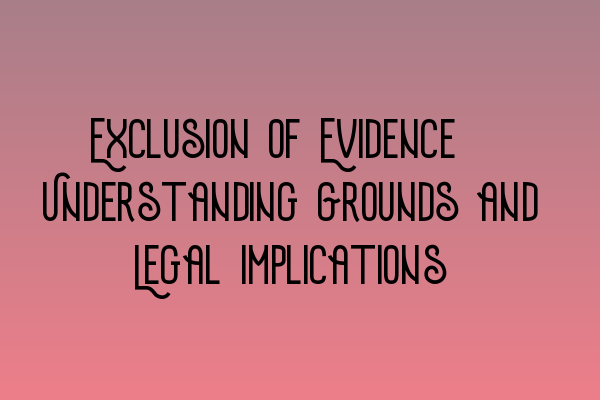Exclusion of Evidence: Understanding Grounds and Legal Implications
Welcome to the SQE Criminal Law & Practice Law UK blog! In this post, we will delve into the complex topic of exclusion of evidence in criminal cases. As a solicitor, it is crucial to have a thorough understanding of the grounds and legal implications surrounding the exclusion of evidence. By grasping these concepts, you can effectively represent your clients and navigate the criminal justice system. Let’s dive in!
What is Exclusion of Evidence?
The exclusion of evidence refers to the legal process of preventing certain evidence from being admitted or considered in a criminal trial. This can significantly impact the outcome of a case, as evidence plays a pivotal role in establishing guilt or innocence.
There are various grounds on which evidence can be excluded. Understanding these grounds is essential to ensure that the evidence presented in a trial is fair and reliable. Let’s explore some of the common grounds for exclusion:
1. Unlawful Search and Seizure
Under the Fourth Amendment of the United States Constitution, individuals are protected from unreasonable searches and seizures. Similarly, in the UK, the Police and Criminal Evidence Act 1984 provides guidelines on search and seizure procedures.
If evidence is obtained through an unlawful search or seizure, it may be excluded from the trial. For example, if law enforcement officers conduct a search without a valid warrant or if the search exceeds the scope of the warrant, any evidence obtained during that search may be deemed inadmissible.
If you want to learn more about search and seizure procedures, check out our Workshops and Seminars on Criminal Practice: Expanding Your Expertise article, where we provide in-depth insights into this crucial area of criminal law.
2. Improper Handling of Evidence
The chain of custody is vital in maintaining the integrity of evidence. If there are gaps or inconsistencies in the documentation and handling of evidence, it may be excluded from the trial. This is to prevent tampering, contamination, or other forms of mishandling that could compromise the reliability of the evidence.
As a solicitor, it is crucial to examine the handling procedures thoroughly and identify any irregularities that may render the evidence inadmissible. Staying informed about updates in the UK criminal laws is essential to ensure you are aware of any changes that may affect evidence handling protocols. We recommend checking out our Updates in UK Criminal Laws: Staying Informed and Prepared article for the latest updates.
3. Hearsay
Hearsay evidence refers to statements made outside of court that are offered for the truth of the matter asserted. Generally, hearsay evidence is considered unreliable and may be excluded from the trial unless it falls within an exception to the hearsay rule. The exceptions allow for certain hearsay evidence to be admitted if it meets specific criteria.
If you are interested in a detailed analysis of the hearsay rule and its exceptions, our article Decoding Criminal Evidence Rules: A Detailed Analysis provides comprehensive insights into this topic.
Legal Implications of Excluding Evidence
Excluding evidence can have significant legal implications for both the prosecution and the defense. When evidence is excluded, the prosecution may face challenges in establishing the guilt of the accused. On the other hand, the defense may benefit from the exclusion, as it weakens the case against their client.
As a solicitor, understanding the potential impact of excluding evidence is essential for building a strong defense strategy or presenting a convincing case for the prosecution. This requires staying informed about the latest developments and enhancing your expertise. Consider joining one of our workshops and seminars on criminal practice to expand your knowledge and sharpen your skills.
Final Thoughts
The exclusion of evidence is a critical aspect of criminal law that solicitors must thoroughly comprehend. By understanding the grounds and legal implications surrounding the exclusion of evidence, you can effectively represent your clients and navigate the criminal justice system.
If you are interested in exploring other fascinating topics related to criminal law, we invite you to read our articles on enhancing your SQE Criminal Law study group experience and delving into fraud and financial crimes in the UK. You can find these articles here:
- Enhancing Your SQE Criminal Law Study Group Experience
- Deep Dive into Fraud and Financial Crimes in the UK
Thank you for reading, and we hope you found this article informative and insightful. Stay tuned to our blog for more updates and valuable resources on criminal law and practice.
